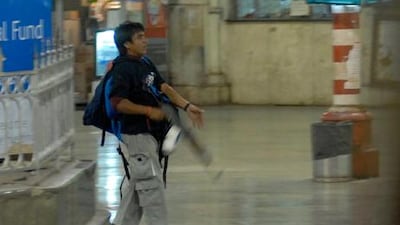NEW DELHI // Selvan Durairaj was out of town today and nowhere near a television. So it came as a shock when his wife called to tell him that Ajmal Kasab, the man who killed his brother, had been hanged.
In November 2008, Jaykumar Durairaj, 33, a telephone exchange employee, had travelled on a short holiday from his home state of Tamil Nadu to Mumbai where he was shot dead at the Chhatrapati Shivaji Terminus - one of the sites hit by a 10-man group of terrorists that killed 164 people over three days.
When Mr Durairaj went to Mumbai to collect his brother's body, he said "the police report said that the person guilty of killing my brother was Kasab".
The lone surviving member of that band of terrorists, Kasab was captured and convicted in May 2010 of waging war against India, murder and terrorism, among other charges. He was sentenced to death and his subsequent appeals were turned down by the Bombay High Court and the Supreme Court.
Kasab, 25, was hanged at 7.30am at the Yerawada Central Jail in Pune.
"I called my parents as soon as I heard," said Mr Durairaj. "This has really reminded them of their loss. They weren't even able to talk to me on the phone. They've been utterly silent all day."
In a news conference following the execution, the Maharashtra chief minister, Prithviraj Chavan, said that Kasab had been discreetly transferred from Mumbai to Pune two days earlier. His mercy petition was rejected by the president, Pranab Mukherjee, on November 5.
"The judge had fixed the date for hanging and the sentence was carried out accordingly," Mr Chavan said.
Although the execution marks the end of the judicial process, some of the relatives of those killed in the November 26, 2008, attacks say that it does not end their suffering, nor does it address who India blames for planning the attacks: the Pakistani group Lashkar-e-Taiba.
Kasab said he was recruited by the organisation after he left a low-paying job as a shop assistant in search of greater fortune as a bandit. The attackers were in regular phone contact with handlers in Pakistan during the siege. K Unnikrishnan is the father of the Indian commando Sandeep Unnikrishnan, who died during the attacks.
"I don't think it is closure," he said yesterday about Kasab's hanging in an interview with television channel CNN-IBN. "We have to negate that attitude towards India in the minds of terrorists. They should not think it [India] is an easy target … Our goal should be to bring to book the perpetrators of 26/11."
Mr Unnikrishnan said Kasab was only a foot soldier in the organisation that planned the attacks. It's an opinion now shared by Mr Durairaj.
When the Bombay High Court confirmed Kasab's death sentence more than a year ago, Mr Durairaj had told The National that terrorists "have no heart". "He deserved the death penalty."
But yesterday, Mr Durairaj seemed to have a change of heart.
"When my brother had just died, of course, we felt so much anger towards these terrorists and towards Kasab," he said. "But it is never pleasant to take a life, and I had even begun to feel a little sorry for him."
Time, Mr Durairaj said, had clarified his thinking. "You begin to see that people like Kasab are small fry. It's really the ones who breed and send these people into India who need to be dealt with."
One of Kasab's accomplices had gone on a shooting spree that night near Leopold Café. Among his victims was Shahbuddin Khan, a 46-year-old tailor who worked in a shop opposite the cafe.
His younger brother Ziauddin Khan, who works in the shop, admitted that when he heard about the hanging, he felt a certain "peace of mind". "It came later than expected, but it was the right decision," he said.
Mr Khan also noted the importance of pursuing Kasab's handlers in Pakistan.
"That was one of the reasons I disagreed with the hush-hush way in which the hanging was done," Mr Khan said. "If he had been hanged in public, maybe it would have sent a signal, instilled some fear in those people. Now they may even claim that Kasab was killed in jail, rather than hanged according to the law."
Mukesh Agarwal, who ran a food court in Chhatrapati Shivaji Terminus in 2008, is pragmatic enough to realise that India faces a challenge in acting against Lashkar-e-Taiba.
"It took four years just to try to hang a man whom we had in our custody," he said. "Imagine how much longer it will take to get our hands on somebody sitting in Pakistan."
During the attacks, Mr Agarwal was sprayed by gunfire in the abdomen and chest. He survived, but several shards of Kasab's bullets remain. "I had to go for so many operations that I gave up the food court after four or five months." He now works at his family's hotel in the Mumbai suburb of Bandra, although he still needs further surgery.
"But that's OK," he said. "Now that Kasab is dead, I can go in for my last operation in peace."
ssubramanian@thenational.ae

